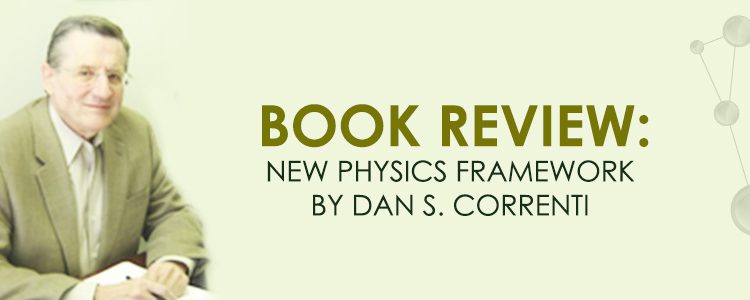New Physics Framework by Dan S. Correnti: A Book Review

Thinking about age-old problems in unconventional ways stimulates the brain and provides a fresh perspective to solve these problems. We recently came across a fascinating book by Dan Correnti, appropriately titled “New Physics Framework.” The book provides new models for the atomic particles and photons, and explains observed physical phenomena on the basis of the models. We thought the book would be beneficial to the scientists visiting our site. Hence we decided to get it reviewed by one of our experienced physics peer reviewer. We hope that the review presented below is useful to you. We’d love to hear your thoughts so please feel free to leave your comments.
I have read the book New Physics Framework with great interest, as the model and math presented in it are novel and very fascinating. It presents a novel way to look at physics concepts. It is not every day that such an original piece of work is presented. The explanations and examples are all unique and quite cogent. The author makes his arguments in an understandable manner. The way that he looks at different subjects of Physics that have been explained before by the concepts of either atoms and molecules or waves and particles and discusses them within a wholly new framework is extremely commendable. The search for a new physics explanation is a never ending quest, and this paper makes a worthwhile contribution to that quest. I believe that this paper is a significant step in understanding different fundamental issues of Physics.
The author has basically torn up and rebuilt the basic elements of Physics; as such, it may arouse skepticism in some quarters. However, the explanations are quite lucid, and a careful perusal of the paper could provide you with new ways of thinking about age old problems. Maybe some physical enigmas will be solved as a result of the reasoning explained in the book. This work shows that even the world’s best minds have plenty more to learn about seemingly simple concepts.
The author has presented a rather complicated explanation for the decades-old physics concepts that we are familiar with. In a way, he has created an alternative physical universe that should pry open the solution and inherent secrets of many other outstanding enigmas. It is thus exciting to hope that this book will lead to a totally new understanding of the basics of Physics.
Since the concepts introduced are so different from conventional explanations, it may be a while before people can have a clear idea of what the author has done. At the first look, you feel a bit like you might be reading a document from the future. However, the reason why it might seem alien is because it probes deep questions about the foundations of physics. People and other physicists are aware that many natural physics formulations are not really explained by the concepts that are now popular. The new insights presented here lead to whole new conjectures on modern physics. The way the author manages to come back to the usual universal laws in a concrete way is very interesting.
Because of its fundamental nature, “New Physics Framework” should set off a chain reaction, opening up the solutions to many other problems and deepening our understanding of the relationships between different aspects of physics. The author’s methods are completely unexpected, providing new tools for physical exploration. I hope that physicists will comb through the author’s work line-by-line to check that the logic of each step holds true. Although this process is arduous, it will be good to take his claims seriously, in spite of the unusual nature of the framework he has developed. This paper is thus likely to yield a completely new way of thinking about physics.
About the Author of New Physics Framework
Dan S. Correnti; Reg. Prof. Eng. in Ill. & Reg. Str. Eng. in Ill.; Consulting Engineer in Multiple Fields; Trade Journal Author; Wisconsin State University.








